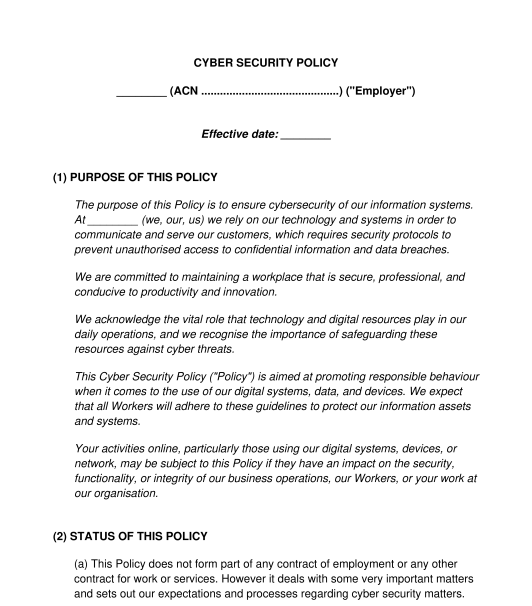 27/11/2025
27/11/2025

Answer a few questions and your document is created automatically.

Your document is ready! You will receive it in Word and PDF formats. You will be able to modify it.

 27/11/2025
27/11/2025
 Word and PDF
Word and PDF
 10 to 15 pages
10 to 15 pages



A Cyber Security Policy is a document used by an employer or organisation, to outline their protocols, standards, and procedures for employees, contractors, consultants and other workers (which we'll just refer to as "employees") to follow in relation to cyber security, both during work hours and in their personal time.
In a Cyber Security Policy, the employer communicates the expectations and requirements of employees with regard to maintaining cyber security. This includes areas such as how and where to access their work devices outside the workplace, the correct storage of devices when not in use, the appropriate handling of sensitive data, reporting a loss or theft of a work device, procedures for system updates, measures to protect data on devices, security when using social media and email, minimum requirements for passwords and restrictions on the use of removable devices.
In addition to a Cyber Security Policy, there are various other employment policies that employers should consider, such as:
This depends on the nature of the organisation and the industry in which it operates. For organisations that operate in regulated industries such as critical infrastructure, financial services, health, or for government contractors, it is often mandatory that the organisation has a written Cyber Security Policy.
Even if it is not mandatory, is is strongly recommended for all businesses in Australia, given the increasing volume and complexity of cyber security risks.
Usually senior members of staff such as managers or directors will prepare the Cyber Security Policy. IT staff are also likely to be involved.
There is no expiry date for a Cyber Security Policy so it can remain in place indefinitely.
However, it should be reviewed regularly to ensure that it is up to date with current laws and with the organisation's current practices.
Once a Cyber Security Policy is ready, it should be printed and/or saved electronically and kept on file with the employer, and employees should be made aware of it. For example, any existing employees should be notified of it and given a copy of it. Many employers use a Letter to Employees about New or Updated Workplace Policies to do this. In addition, each time a new employee starts work with the employer, the new employee should be given a copy of the policy.
It is also a good idea to keep the policy in a place where it is easy for employees to refer to it - for example, physical copies could be kept in communal areas such as staff rooms. It could also be made available online, for example on the employer's shared drive.
If the employer is getting employees to sign this policy, the employer should get each employee to return a signed signature page, and should keep those signed pages on file.
From time to time, if the employer implements new rules or procedures, it may be necessary to update the policy. When this occurs, the employer may notify employees of the updates, and release a new version of the policy. The employer may ask employees to sign a new signature page at that time, to acknowledge the updated policy.
This document should be used by an employer wishing to outline their rules and practices concerning cyber security. The document can include information about:
The employer must ensure the document truly represents their actual approach to these matters. The Australian Government's Business website provides useful guidance about cyber security. If in doubt, seek professional advice from lawyers and/or IT professionals.
Cyber Security Policies may be influenced by various Australian laws. These include but are not limited to:
In addition, the Fair Work Act 2009 (Commonwealth) deals with other employment matters such as unfair dismissal.
Ordinary principles of contract law, as provided by the common law, may also apply to the general terms of the employee's employment.
You fill out a form. The document is created before your eyes as you respond to the questions.
At the end, you receive it in Word and PDF formats. You can modify it and reuse it.
Cyber Security Policy - sample template - Word and PDF
Country: Australia